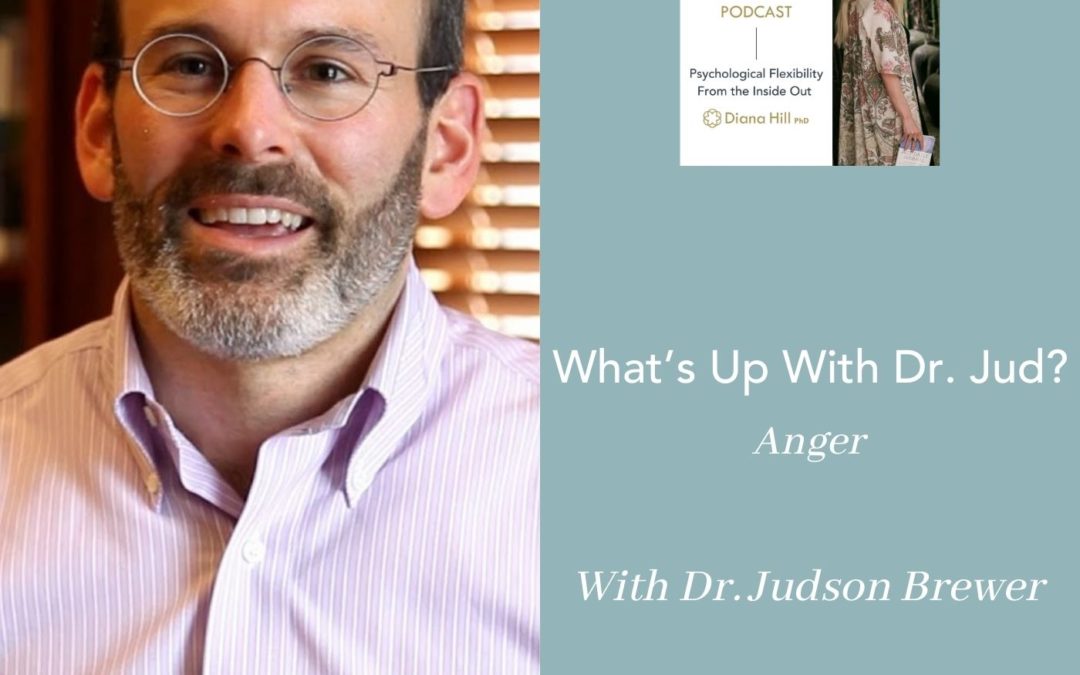Are you a little angrier, irritable, or quick to lash out these days? Anger is a challenging emotion. And according to Dr. Jud, it can become a habit. What is fueling your anger and how can you break the habit loop of resentment? What can we learn from behavioral neuroscience and ancient wisdom to respond differently when we’re triggered? Listen to today’s episode to learn how to turn your anger into compassionate action.
About Dr. Judson Brewer
Jud Brewer MD PhD (“Dr. Jud”) is a New York Times best-selling author and thought leader in the field of habit change and the “science of self-mastery”, having combined over 20 years of experience with mindfulness training with his scientific research therein. He is the Director of Research and Innovation at the Mindfulness Center and associate professor in Behavioral and Social Sciences and Psychiatry at the Schools of Public Health & Medicine at Brown University. He is also the executive medical director of behavioral health at Sharecare Inc. and a research affiliate at MIT. A psychiatrist and internationally known expert in mindfulness training for addictions, Brewer has developed and tested novel mindfulness programs for habit change, including both in-person and app-based treatments for smoking, emotional eating, and anxiety. He has also studied the underlying neural mechanisms of mindfulness using standard and real-time fMRI and EEG neurofeedback. He is the author of The Craving Mind: from cigarettes to smartphones to love, why we get hooked and how we can break bad habits and the New York Times best-seller, Unwinding Anxiety: New Science Shows How to Break the Cycles of Worry and Fear to Heal Your Mind. Follow him on Twitter @drjudbrewer
Key Takeaways
- Anger is an emotion that has a mechanism that keeps it going and reinforces it
- Often anger can be triggered by getting something we don’t want, having something we want taken away, or when we feel our values are threatened
- Evolutionarily, anger may be linked to maintaining our social status
- Anger can become a habit loop with a trigger, behavior, and result associated with it. The first step in changing your anger habit is to map out its loop
- It is possible to take action against injustice without acting from anger, but acting from compassion and values
- For long-term change, focus on the bigger better offer of being compassionate
Related Resources
- Download Your Daily Practice for this episode
- Find out what kind of Striver you are and get your free Skillful Striving Toolkit
- Read Dr. Jud’s books: The Craving Mind and Unwinding Anxiety
- Learn more about Dr. Jud’s Aps and programs for eating, anxiety, and smoking
- Check out Dr. Jud with Diana on the From Striving to Thriving Summit 1.0
- Research study Diana mentions about compassion meditators and anger
- Learn more about Lightfully Behavioral Health
Diana’s Events
- Reserve your spot in Diana’s Reset and Restore Retreat in Costa Rica in 2023!
- Sign up for Diana’s From Striving to Thriving Summit!
- See Diana at an upcoming event
Connecting With Diana
Thank you for listening to Your Life in Process! Subscribe to the podcast for free on Apple Podcasts, Spotify, Google Podcasts. If you have any questions or feedback you can contact Diana by email podcast@yourlifeinprocess.com or leave Diana an audio message at (805) 457-2776. Follow Diana at YouTube, Instagram, LinkedIn, Facebook, and Diana’s website.
Thank you to the team Craig, Angela Stubbs, Ashley Hiatt, and Abby Diehl. Thank you to Benjamin Gould of Bell & Branch for your beautiful music.
Remember when you become psychologically flexible, you become free.
Episode Segments
- [00:00] – Introduction
- [01:11] – About Dr. Jud
- [2:33] – Sponsor: Lightfully Behavioral Health
- [3:33] – Dr. Jud’s Personal Experience With Anger
- [7:58] – Diana’s Personal Experience With Anger
- [9:26] – What Mechanism Drives Anger?
- [13:34] – How Values Are Related To Anger
- [15:31] – Self-Righteous Anger
- [18:09] – The Behavioral Neuroscience Of Anger
- [20:44] – Anger As A Habit Loop
- [24:32] – The Costs Of Anger
- [31:04] – Compassion And Anger
- [33:36] – 3 Steps To Changing Your Anger Habit
- [43:19] – Your Daily Practice
- [45:18] – Connect With The Podcast


